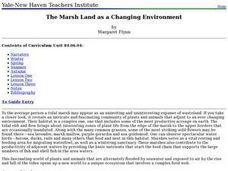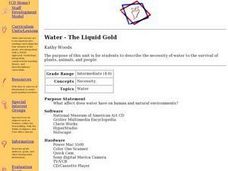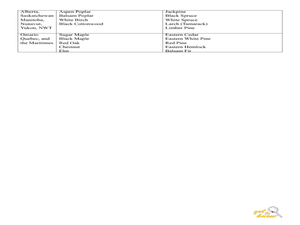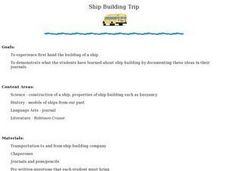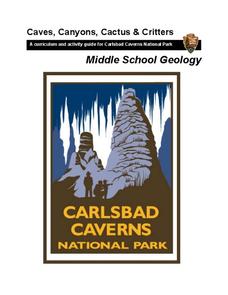Curated OER
Quad Squad
Students pretend they have visited a forest research station on an overnight field trip. They study forest fires, use compass directions, read maps, interpret imagery, and think about the impact of fire on ecosystems.
Curated OER
Food Webs in a Pond
Learners explore food chains and food webs in a pond and identify common creatures found in ponds. They look for tadpoles, fish, mites and other creatures in a pond during a field trip for first hand research.
Curated OER
Beach Zonation
Students explore biology by participating in an organism identification activity. In this beach field trip lesson, students identify the different areas of the beach in which organisms reside and discuss the differences between high tide...
Curated OER
Bugs, Worms and Others
Learners explore biology by conducting an outdoor research activity. In this insect identification lesson, students collaborate with classmates to examine organisms they find on a class field trip either in their school playground or a...
Curated OER
Field Trip to your Square
Students visit an outdoors area and mark out a square on the ground that they examine. They look for and record the plants, animals, and non-living things they find in the square and post their findings on the Internet for other classes...
Curated OER
Exposition Park Virtual Birding Field Trip
Students explore a variety of sources, including their experiences in visiting places. They access information online, observe and make determinations based on observations. Students hypothesize about observations of bird behavior.
Curated OER
Cherokee Leaf Printing
Young scholars investigate their local creeks and forests and practice identifying trees. For this ecology identification lesson plan, students utilize a pad and pencil while on a field trip near their school and describe their...
Curated OER
The Marsh Land as a Changing Environment
Sixth graders continue their examination of the state of Connecticut. After taking a field trip, they identify the types of birds, plants, invertebrates and vertebrates who make their home in the salt marshes. In groups, they identify...
Curated OER
Water-The Liquid Gold
Students investigate the necessity of water for the survival of plants, animals, and people. They explore the affect that water has on human and natural environments through literature, field trips, and discussions.
Alabama Learning Exchange
Is it a Moth or a Butterfly?
Second graders examine the similarities and differences between moths and butterflies. They participate in a virtual field trip using a designated web site. They design a computer based slideshow using the information they find on the...
Curated OER
"Five Little Seeds"
Fourth graders complete various activities related to the plant life cycle. They read the book "The Tiny Seed," read and discuss the poem "Five Little Seeds," complete a "Plantenstein Mystery" and other online activities, write and...
Curated OER
Get to Know Trees
Students recognize the characteristics of trees by using their five senses. In this trees lesson, students observe and record the characteristics of trees on a field trip. Students then are blindfolded and use their senses to identify...
Curated OER
Get- To Know Mammals
Students take a field trip and record information about mammals. In this mammals lesson, students hunt for tracks, waste, or other evidence that a mammal exists in this habitat. Students complete a worksheet on the evidence they have found.
Curated OER
What Lives in the Forest?
Students investigate nearby forests and record their interactions with trees as well as wild life. In this ecology lesson, students read the book, In the Woods: Who's Been Here?, and attend class observational field trips through...
Curated OER
Hold It
Young scholars explore animal characteristics by examining water currents in person. In this animal strength lesson, students discuss tides and currents and attend a field trip in which they are in contact with flowing water. Young...
Curated OER
Rock Pioneers
Students explore geology by participating in a field trip exercise. In this rock analysis lesson, students discuss rock formations and how water moves rocks according to the tide. Students conduct a tide activity by marking a rock of...
Curated OER
What does 'Endangered' mean?
Students discuss a variety of teacher led discussion questions about what makes an animal endangered. They take a short field trip to an open area and set a boundary for each child for them to either write or draw about how the location...
Curated OER
Ship Building Trip
Students travel to a ship building plant to see how they are built. They enter into discussion and writing about the task of the building. This lesson is multiple intelligence in design and valuable because of the real life exposure.
Channel Islands Film
Natural Resources, and Human Uses of Plants and Animals
As part of their study of the restoration projects on Santa Cruz Island, class members demonstrate their understanding of the connections among plant life, animals, and the actions of humans by crafting a model that reveals these...
University of California
You Are What You Eat: Testing for Organic Compounds in Foods
We have all heard that we are what you eat, but what are we eating? An informative lesson opens with a discussion of the foods pupils have recently eaten. Then, young scientists perform four experiments on seven...
Space Race
Sensory Detectives
Test your learners' sensory awareness with three hands-on activities that ask pupils to use their other senses to identify and describe everyday objects hidden from sight.
National Park Service
Caves, Canyons, Cactus, and Critters
Mother Nature's Gravel Company is open for business! The unit includes four lessons covering weathering and erosion. Experiments are simple to complete and young geologists compare notes to see who makes the biggest ice...
Star Date
Modeling the Night Sky
Dramatize the stars and planets as they become a visual representation of the solar system in this activity. Young astronomers track and simulate various constellations as they orbit the Earth to learn the position and motion of...
National Institute of Food and Agriculture
Water Pollution Demonstration
Water pollution is everywhere, and pollutants range from oil to fertilizers. Bring the concept to life by demonstrating the difficulties in getting particular pollutants out of water.
Other popular searches
- Science Field Trips Lessons
- Science Field Trips
- Science Virtual Field Trips
- Science Museum Field Trip
- Science Zoo Field Trip
- Field Trip Science Kits







